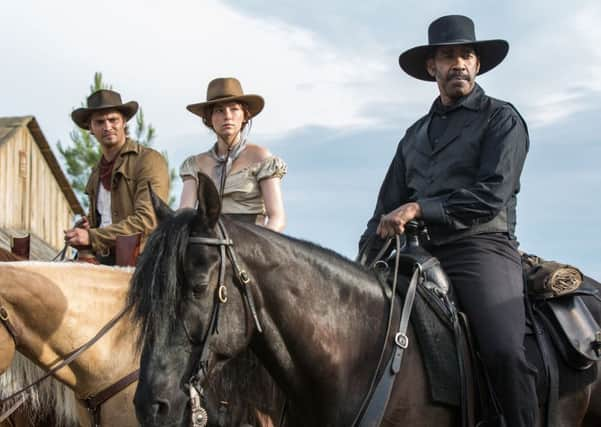Back in the saddle


It’s that mythic question beloved by all pub quizzers, but that never comes up: can you name the actors from The Magnificent Seven – and the characters they played?
If you’ve ever been a collector of useless information then this nugget presents opportunities for a party piece. And the answer is as follows: Yul Brynner (Chris), Steve McQueen (Vin), Horst Buchholz (Chico), James Coburn (Britt), Charles Bronson (O’Reilly), Robert Vaughn (Lee) and Brad Dexter (Harry Luck).
Advertisement
Hide AdAdvertisement
Hide AdIt’s poor old Brad Dexter that people tend to forget. He’s the one whose career failed to take off. And, sadly, he’s long gone – just like Brynner, McQueen and Co. The sole survivor is Robert Vaughn, still working at age 83.
John Sturges’ 1960 horse opera has rightly passed into movie lore. There were sequels and a TV show. Now there is a remake with Denzel Washington leading his guns-for-hire into the fray.
Much of the appeal of Sturges’ movie comes from the stand-off between its anti-heroes and Calvera, the Mexican bandit chief played with relish by Eli Wallach. Referring to the impotent villagers who have hired Brynner and the rest to defend them, he gets one of the best lines: “If God had not wanted them sheared, he would not have made them sheep.” It underlines the entire picture.
Many of those for whom The Magnificent Seven represents the western at its best fail to remember that it was a remake, and that the notion of seven warriors protecting a village from feral predators came from a Japanese original.
Advertisement
Hide AdAdvertisement
Hide AdAntoine Fuqua, director of the 2016 version, willingly and gratefully acknowledges the debt he owes to Akira Kurosawa, the Japanese maestro whose three-hour black-and-white masterpiece Seven Samurai, from 1954, provided a loose template for Sturges and his ensemble. Its star was the majestic Toshiro Mifune.
“If you watch that movie and see the body language of the poor, they’re on their knees,” muses Fuqua, director of Training Day and The Equalizer. “Nobody in Kurosawa’s movie is all good, but the other people are worse.
“There’s a scene where Mifune has found samurai swords. He asks the townspeople, ‘Where did you get these from?’ He realises that they were killing samurai – finding them after a battle, scavenging and killing them.
“The samurai realise that the people they are saving have been killing them. So there’s no black and white. It’s all grey. But evil needs to be dealt with by men who are capable, even if those men have done bad things. That’s what this is all about for me: staying true to that.”
Advertisement
Hide AdAdvertisement
Hide AdWilliam Roberts’ screenplay for the 1960 film creates a septet of clearly delineated gunslingers. Chris is the old hand, a man who’s seen too much and finds his conscience pricked by an earnest appeal by peasants who need bad man to kill even badder men. Vin fits the same pattern.
Britt is a taciturn maverick equally proficient with a switchblade as a six-gun. Lee is struggling to maintain his reputation as an elegant killer in the knowledge that his nerve has gone. O’Reilly was once a premier fixer, now fallen on hard times. Harry Luck is a gambler and scents gold at the end of the rainbow. And Chico, aspiring to be the next great gunslinger, is revealed to be a peasant farmboy.
That only three survive says much for Roberts’ script: these men must pay for past sins. Their deaths represent their redemption. In Fuqua’s film the Seven are a ragbag collection of miscreants with a variety of racial roots. They include a bounty hunter, a gambler, a sharpshooter, a tracker, an assassin, an outlaw and a Comanche warrior. Chris Pratt, playing Faraday, gives an indication of how the new guys have been created.
“Faraday is a bit of a fox,” he says. “He’s a trickster, he’s light-hearted, a gambler, a drinker, a cigar-smoker, loves the ladies, but he’s deadly. He’s calm and cool in a fire-fight.”
Advertisement
Hide AdAdvertisement
Hide AdAll of which seems to indicate that the scriptwriters have gone for a box-ticking scenario that echoes the comic-strip ensembles of late. But Denzel Washington, playing leader Chisholm, insists the cross-section is not about stereotypes but instead a reflection of the Old West and the people who lived there.
“It speaks for the reality of the 1870s,” he insists. “That’s more typical than movies of 40 years ago where nobody looked like us [African-Americans]. I can’t speak for the director but it wasn’t a matter of, ‘We’re going to do this for that reason’. I mean, I just wanna be in Chris Pratt’s movie…”
For Fuqua it goes past Brynner, McQueen and Bronson and back to Kurosawa, Mifune and the samurai. The new movie might be packed with stunts, explosions and gunplay, but it is Akira Kurosawa to whom Fuqua looks when considering his own entry into the genre and its contemporary relevance.
“Kurosawa set the bar,” he says with due respect. “The DNA of this whole movie was in his hands. He was very well-read – he read a lot of Russian literature by people like Dostoevsky – and he was fascinated by human behaviour.
Advertisement
Hide AdAdvertisement
Hide Ad“I grew up watching westerns and I also watched Kurosawa’s original. They were always about people coming together to do the right thing. That’s diversity.”
Pratt agrees. “These are seven men who say what they are gonna do. I think that type of mentality is rare nowadays. Sometimes it’s tough and people back out. That’s not the mentality of the Magnificent Seven. They say they’re gonna do it, and they do.”
The Magnificent Seven (15) is out in cinemas now.